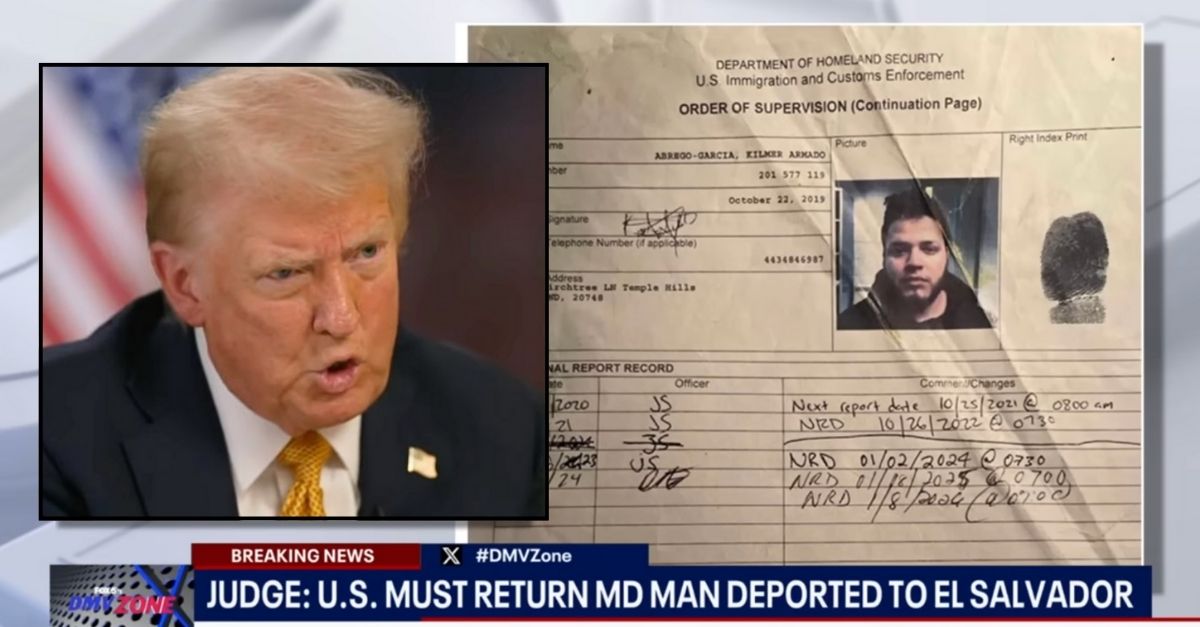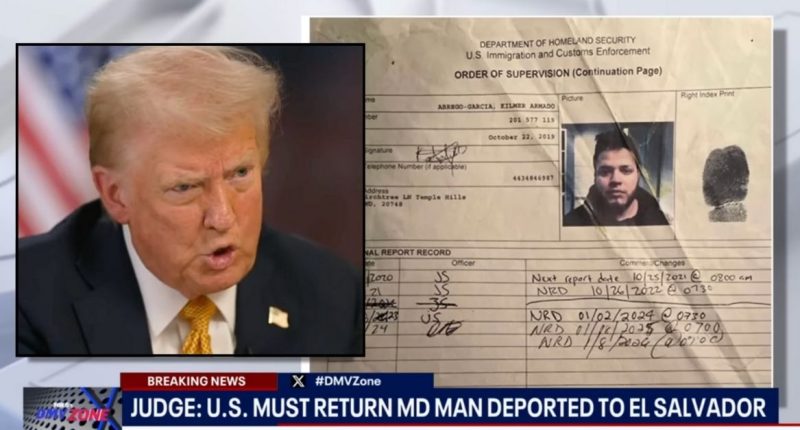
Inset: President-elect Donald Trump on “Meet the Press” Sunday, Dec. 8, 2024 (NBC News/YouTube). Background: Immigration records for Kilmar Abrego Garcia (WTTG/YouTube).
The Trump administration is taking its fight over the court-ordered return of Kilmar Abrego Garcia — a protected Maryland resident who was mistakenly shipped off to a prison in El Salvador — back to the U.S. Court of Appeals, claiming the federal judge overseeing his case has “crossed” a constitutional line and created a “fishing expedition” with her judicial demands.
“The federal courts do not have the authority to press-gang the President or his agents into taking any particular act of diplomacy,” the Justice Department said Wednesday night in an emergency motion to stay the Abrego Garcia order from U.S. District Judge Paula Xinis in Maryland, which called on the government to “facilitate and effectuate” the return of the 29-year-old dad to the United States as soon as possible.
Xinis followed up her April 4 order with requests for documents from Homeland Security and DHS Secretary Kristi Noem — defendants in a lawsuit brought by Abrego Garcia’s legal team — as well as testimony from Trump administration officials, explaining why Abrego Garcia wasn’t being brought back.
“[The district court] ordered extensive and expedited discovery into the Executive Branch to probe how it has (or might) effectuate this ill-defined directive,” the DOJ’s motion said Wednesday.
“The result is a fishing expedition, captained by plaintiffs armed with an open-ended mandate, who have already ordered scores of production requests, burdensome interrogatories, and at least four (and perhaps more) depositions of Executive Branch officials,” the DOJ said. “At minimum, that is untenable, and mirrors mistakes regarding governmental discovery that other appellate courts have corrected in mandamus.”
Attorneys for Abrego Garcia — a native of El Salvador who was in the U.S. with protected legal status at the time of his deportation — have accused the DOJ of flouting orders from the U.S. Supreme Court and Xinis instructing the government to return Abrego Garcia to the United States. A three-page filing Tuesday alleges that Trump administration officials have been intentionally misconstruing court orders since Abrego Garcia, whose wife and child are both U.S. citizens, was deported in “error” in March under President Donald Trump’s unprecedented use of the Alien Enemies Act of 1798 (AEA), a wartime authority previously invoked only three times, the last of which was during World War II.
On April 10, the high court largely upheld Xinis’ prior order requiring the Trump administration to “facilitate” Abrego Garcia’s release from the Salvadoran work prison. Xinis subsequently ordered the DOJ to inform her of Abrego Garcia’s current status and the steps the DOJ has taken and plans to take to “facilitate” his return to the U.S. The Trump administration has been outwardly defiant, repeatedly stonewalling the court with daily updates that provide Xinis with little to none of the information requested.
Fed up with the government’s “gamesmanship” and “grandstanding” over the deportation case, Xinis tore into the Trump administration on Tuesday following yet another nose-thumbing by the Justice Department in court filings, with DOJ lawyers and administration officials being blasted for not providing proper updates and blatantly ignoring judicial orders related to Abrego Garcia’s situation.
The DOJ filed its emergency motion to stay Xinis’ order with the 4th U.S. Circuit Court of Appeals on Wednesday night, along with court documents saying it would be appealing a recent order from U.S. District Judge James Boasberg that said there was probable cause to bring forward criminal contempt charges for the government’s alleged refusal to follow his order to return Venezuelan immigrants who were deported with Abrego Garcia on March 15.
More from Law&Crime: ‘DHS would take him’: Trump admin doubles down on barring wrongly deported dad’s return as attorneys allege president is ignoring SCOTUS order
Trump’s DOJ lawyers have repeatedly cited his Article II power as president for why his administration has the right to keep Abrego Garcia away. “Article II of the Constitution bestows on the President — and through him, the Executive Branch — the exclusive power over foreign relations,” the DOJ told the 4th Circuit.
“The Supreme Court reaffirmed that principle in this very case, unanimously rejecting the District Court’s unprecedented command that the Executive actually effectuate the return of Abrego Garcia from El Salvador — i.e., force a foreign sovereign to relinquish one of its own citizens,” the DOJ motion said. “Under the guise of an amended order, however, the same District Court has set down the same unjustifiable path, all in service of a member of a foreign terrorist organization with no valid right to be in the United States in the first place. This Court’s immediate intervention is needed.”
The DOJ, once again, asserted in its plea to the 4th Circuit that the president and executive branch must be allowed to remove “any domestic barriers” to Abrego Garcia’s return. “It does not, and constitutionally cannot, involve a directive to take any act upon a foreign nation,” the DOJ insisted. “The District Court, though, has again crossed that line.”
Abrego Garcia’s lawyers filed his suit on March 24; Xinis ordered the Trump administration to “facilitate and effectuate” his return on April 4. Three days later, the court of appeals affirmed the district court and denied a stay pending appeal that was requested by the DOJ, per its Wednesday motion.
Judge J. Harvie Wilkinson III, a Ronald Reagan appointee, “concurred only in the denial of the motion for a stay pending appeal,” according to the DOJ, and he wrote to “emphasize” that the district court’s original order “should be read no broader than requiring ‘the government ‘facilitate’ the plaintiff’s return to the United States,”” the DOJ said Wednesday.
“Judge Wilkinson stressed ‘the Executive’s broad authority in international relations must afford it latitude as to how the facilitation of Abrego Garcia’s release can best be accomplished,’” the DOJ stated. That same day, April 7, the Trump administration appealed to the Supreme Court.
Chief Justice John Roberts issued an administrative stay “to forestall the District Court’s arbitrary deadline,” as the DOJ puts it.
“A few days later, the Supreme Court granted Defendants’ application in part,” the Wednesday motion claims. “The Court affirmed that Defendants must ‘facilitate’ Abrego Garcia’s ‘release from custody in El Salvador.’ But it did so only insofar as such directive gave ‘due regard for the deference owed to the Executive Branch in the conduct of foreign affairs,’ id., and tracked the ‘well-established policy’ of the Executive Branch.”
In the eyes of the Trump administration and DOJ lawyers, the Supreme Court “unanimously rejected the District Court’s unprecedented directive to effectuate Abrego Garcia’s removal from El Salvador.” The DOJ said Wednesday that doing so would be the same as forcing “a foreign sovereign to relinquish one of its own citizens being ‘detained pursuant to [its] sovereign, domestic authority.’” They again accused Abrego Garcia of being a criminal, despite no evidence being presented to prove this.
“Mr. Abrego Garcia has never been convicted of a crime,” his legal team said in a statement this week, according to NBC News.
“If the government believes there is a legitimate case to be made, it should present that case in a court of law and have a judge review and decide his fate — not on social media,” his lawyers also said. “We look forward to the government complying with the Court’s order and facilitating Mr. Abrego Garcia’s immediate release from custody in El Salvador. We will continue to fight for our client’s safe return and to ensure his constitutional rights are fully restored.”
Reports about Abrego Garcia’s alleged criminal past and ties to MS-13 have circulated online. A 2021 protection order filed by Abrego Garcia’s wife, Jennifer Vasquez Sura, grabbed headlines this week after it was released to the public. She provided an explanation Wednesday.
“After surviving domestic violence in a previous relationship, I acted out of caution after a disagreement with Kilmar by seeking a civil protective order in case things escalated,” Vasquez Sura said in a statement to NBC News.
“Things did not escalate, and I decided not to follow through with the civil court process,” she added. “No one is perfect, and no marriage is perfect. That is not a justification for ICE’s action of abducting him and deporting him to a country where he was supposed to be protected from deportation.”
Love true crime? Sign up for our newsletter, The Law&Crime Docket, to get the latest real-life crime stories delivered right to your inbox.
Jerry Lambe contributed to this report.







